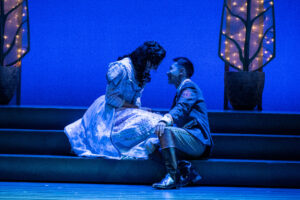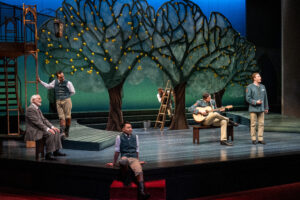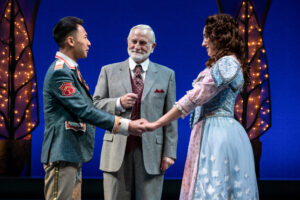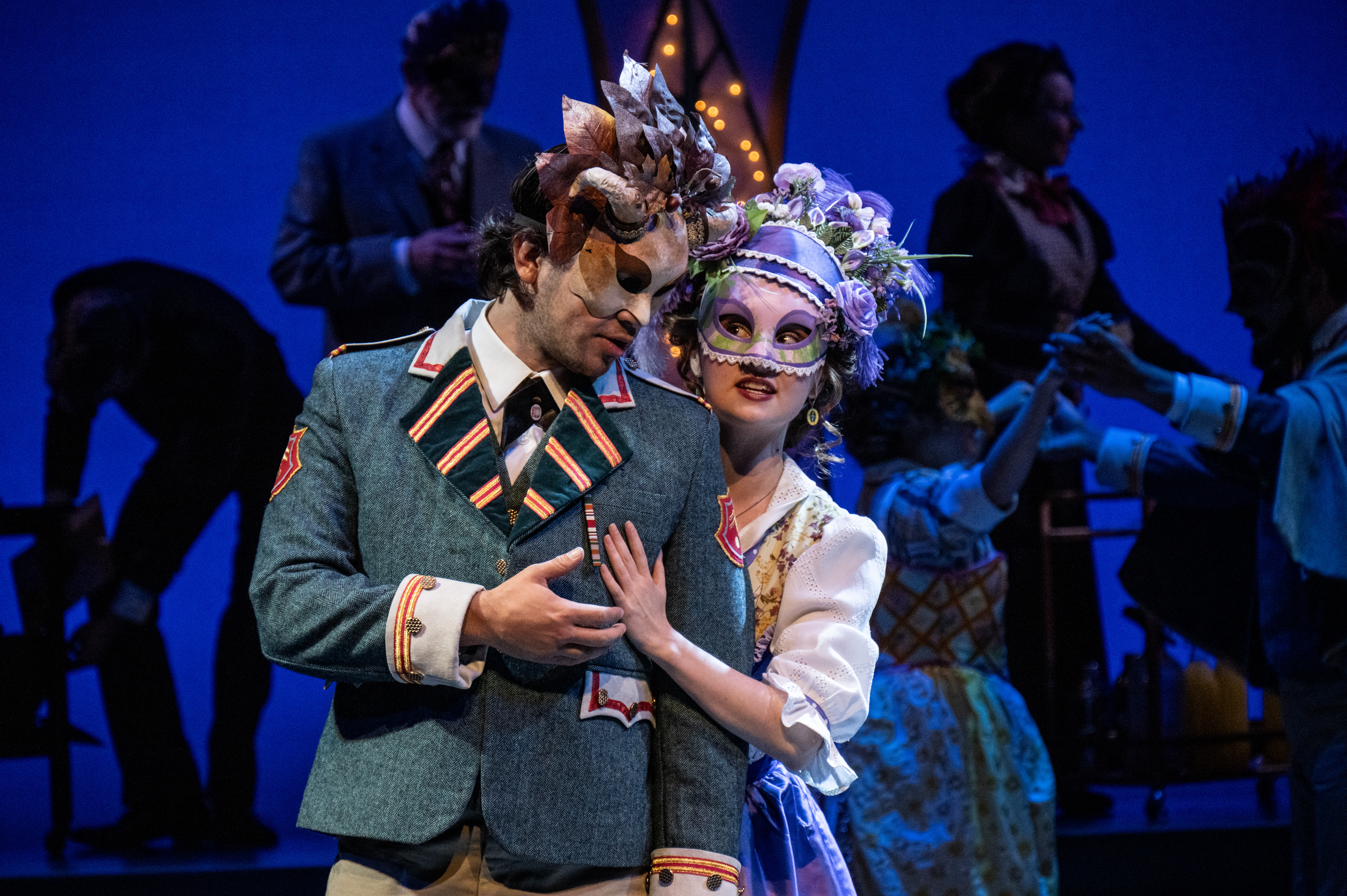CEDAR CITY — The Utah Shakespeare Festival’s Much Ado About Nothing, directed by Brad Carroll is playing in the Randall L. Jones theatre this season. Although staging Shakespeare in the Jones theatre is done less often at the festival, the Jones is a perfect fit for this production.
Entering the gold accented theatre, the audience is greeted with a beautiful set, designed by Jason Lajka, in pastel hues with a sweeping line of delicate arches and a row of stylized potted plants made out of a sheer material. The stage features curved walkways with a graceful staircase to an upper landing downstage right. A large cyclorama screen covers the entire upstage wall and is likewise lit in ephemeral pastel hues. The lighting by Clair Chrzan is lovely throughout the production, progressing from pastels to neutrals and occasionally projecting a large moon in different phases on the cyc, supporting the progression of the play itself. The cast interaction with the backlighting during scene changes creates delicate silhouettes, adding to the overall soft tone of the show.

Much Ado is perhaps my favorite of the bard’s comedies with its witty dialogue and relatable characters, particularly in Benedick and Beatrice. Carroll’s staging is generally clean and interesting, using the space well–particularly in the two eavesdropping scenes where Benedick and Beatrice in turn poorly camouflage themselves to listen in on the conversation of other characters. The masquerade dance sequence, choreographed by Trey Plutnicki is clever as each couple weaves into the spotlight in turn for their exchanges.
The costuming is likewise delicate and lovely. Designed by Brenda Van der Wiel, the costumes have a loose 1910-1920s feel with a hint of timelessness. The soldiers uniforms are smartly designed and intentionally reflect no particular nationality, setting the show somewhere just outside of any real time or place.
Melinda Parrett as Beatrice and Walter Kmiec as Benedick are the strongest among a cast of strong players, with Blake Henry as a very capable and funny Dogberry entering later in the production. The comic timing of these three is impeccable. Carroll’s directing leans into these actors’ comic ability, drawing out awkward pauses, uncomfortable interchanges and physical gags with such expertise that I found myself laughing out loud throughout the production.
The Benedick set-up scene in the orchard is particularly funny. The flown in row of sheer lemon trees is not only beautiful, but offers a perfect vantage point for Benedick to perch and view the scene. As he descends from the ladder there is an encounter with a bucket that I won’t spoil for you, only to say that what I thought was going to be just a silly gag was masterfully drawn out into the rest of the scene as a long running element of physical comedy earning laugh after laugh after laugh—including a well placed mocking laugh from Beatrice at the end of that sequence. Kmiec’s Benedick is not only a master of witty repartee, but is also adept at vocalization, innuendo and physical comedy. These elements, layered onto Shakespeare’s masterful language create a character that is simultaneously hilarious, pathetic and likeable.

The interplay between Parret as a capable Beatrice and Kmiec, especially in a scene at the front edge of the stage where the two are awkwardly exploring their feelings for each other like a couple of tweenagers on a first date is exquisite. The one element that struck me as odd was the delivery of Beatrice’s “Kill Claudio” line, delivered almost as a yell to Benedick, which earned a hearty laugh from the audience at a moment where comedy didn’t feel like the appropriate tone to take. Although I’m not sure that the actor, nor director were aiming for a laugh at that moment, still it all just felt uncomfortably wrong. Maybe that was the point—laugh or squirm uncomfortably, the direction to kill Claudio is a hard pill to swallow, for Benedick and the audience.
Kmiec plays Benedick’s soliloquies to the audience in a natural and expert manner inviting us into his thoughts. Beatrice also has a soliloquy that Parrett takes into the front row and has a touching moment with an audience member. This movement into the audience creates a needed moment of vulnerability in Beatrice that aids in her overall character arc.

Blake Henry’s Dogberry is outstanding. Initially I was unsure how to read Dogberry as Henry doesn’t play him as an outright buffoon in the way it’s often done. Instead Henry’s Dogberry is more earnest than stupid and his fumbles and stumbles more endearing than they are foolish. I found myself liking the character as much as I was laughing at him. This earnestness is aided by an interesting choice to play Dogberry’s partner Verges as his mother (played by Evelyn Carol Case), adding an additional layer of humanity to Dogberry through their interchanges. Henry exhibits great capacity for physical comedy (seen in repeated prat falls) and impeccable timing (as in the whole “I am an ass” sequence and, along with the rest of the comically adept cadre of watchmen creates a delightful counterpoint to the main action of the play.
Perhaps the most difficult part of Much Ado for modern audiences is the dated gender norms surrounding courtship and female virtue. As was discussed in the festival play seminar held in the grove between the Englstad and Jones theatres the morning following the performance, there is a theme running through the entire 2024 season of men behaving badly and women ultimately forgiving them (think The Winters Tale and Taming of the Shrew). This is an often difficult plot element to accept in Much Ado as one could easily ask why Hero takes Claudio back at all in the end. Carroll describes Much Ado as “a tale of forgiveness and second chances” and through this beautiful production, I am reminded that at times, everyone is in need of both.
[box] Much Ado About Nothing plays in repertory in the Randall L. Jones theatre as a part of the Utah Shakespeare Festival. The show plays through October 5 with evening and matinee performances. Tickets are $30-85. For more information, visit www.bard.org [/box]
